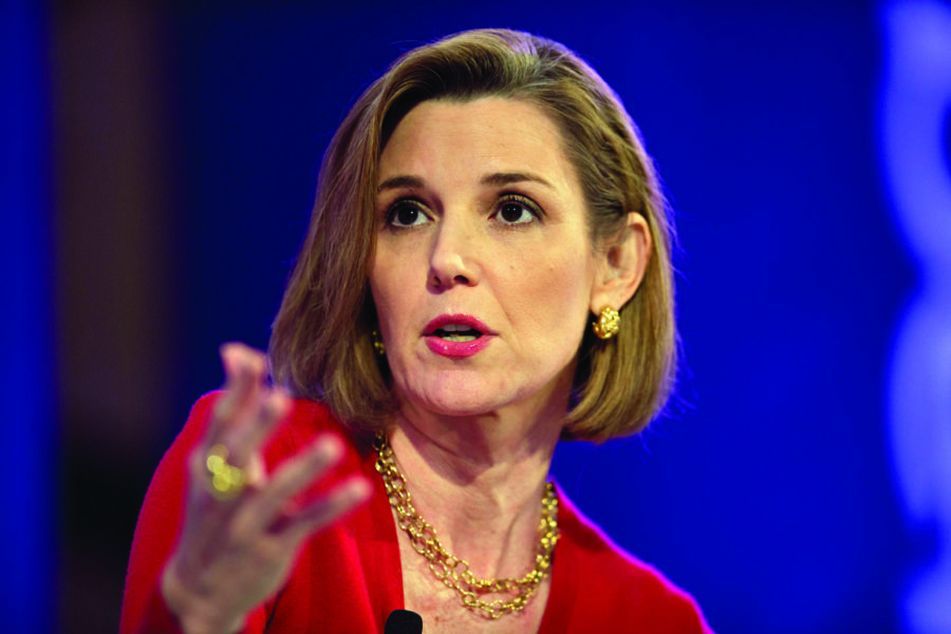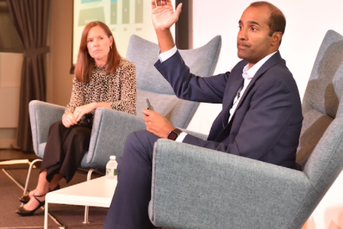‘Women are losing their jobs at a greater rate than men’: Sallie Krawcheck

The Ellevest CEO is using her tech to help women who have been disproportionately impacted by the pandemic
It’s no secret that there is truth in the phrase money is power and for women to fully experience gender equality in all forms, taking ownership of their finances and investments is the place to start.
That’s the mission of the digital investing platform Ellevest, the robo-adviser built by women, for women that launched in November 2016.
Co-founder and CEO Sallie Krawcheck has dedicated the digital investment platform to offer investment and banking products built with a gender aware investing algorithm while understanding that “financial equality equals equality,” she said.
However, that doesn’t mean Ellevest offers products that are dumbed-down or presented with pink flowers and a ribbon. Instead, the robo-adviser aims to deconstruct the system and preconceived notions that have been built by and for men with a sophisticated digital-first investment platform operated with a women-first lens.
Four years, several funding rounds and more than $634 million in assets under management later, Ellevest has ranked in the top 10-performing robo-advisers leapfrogging Wells Fargo, Wealthsimple, SoFi, Wealthfront, Merrill Edge and Schwab, according to Backend Benchmarking’s second-quarter Robo Report.
“Ellevest is operating at the intersection of a few mega trends,” Krawcheck said. “The digitization of finance, the rise of women as an economic and financial power and the rise of mission-driven brands and impact investing.”
What follows is an edited version of Krawcheck’s conversation with InvestmentNews.
Nicole Casperson: Talk to me a bit about the ‘she-cession’ we are facing today as the pandemic has disproportionately impacted women and women of color?
Sallie Krawcheck: I would start off by saying that there is a ton of ink built on the gender pay gap — that 82 cents women earn to a man’s dollar. Yet, there is not nearly enough attention paid to the more important gender wealth gap, which shows women keep 32 cents to a white man’s dollar. Of course, for your readership, the place they can have more impact is on the gender wealth gap.
There are things like women having more credit card debt, women having more student loan debt, women not investing as much and women not owning as much real estate that contribute to this. OK, so that sort of sets the scene.
Now, in the pandemic, we are experiencing a ‘she-cession,’ and women are risking their lives at a greater rate than men are because they make up a greater share of essential workers.
In that light, women are losing their jobs at a greater rate than men have, because there are a greater share of service workers. And women, even women who are able to work from the home, are losing productivity — whereas men are gaining productivity by working from home.
There’s research amongst academics that show men are more productive during the pandemic, whereas women’s productivity has been plummeting because of traditional gender roles in the household. Women take on more of household duties, taking on more of the childcare and household care, parental care duty, and because of that more mothers are considering leaving the workforce.
So I almost can’t believe we’re talking about anything else but this. This is such a big deal. And somehow, we tend to state the facts in a regular voice in our indoor voice when we should be using our outdoor voices.
NC: How does your firm leverage its digital platform to help fill the gap as a female-focused robo-adviser?
SK: What we have done differently from everybody is made very few assumptions — we questioned and prodded everything. For example, there is this idea that women are more risk averse than men, women do not invest as much as men do as a percentage of their wealth, but when they do they tend to be in less risky investments — therefore, women are risk averse.
So where did that come from?
With our offering we somehow need to change their behavior, or convince women that this way of being is not correct … so let’s build a marketing program around convincing women to change. There we go — and now we have a newsletter and away we go. What we did at Ellevest is say: ‘Women don’t invest as much as men do. Ah, OK that’s just one hypothesis that women are more risk averse. There’s just something about having a uterus that means we won’t take as much risk.’
The industry is not doing a good job of offering women a product service experience that will encourage them to invest. Perhaps in an industry where 98% of mutual fund dollars are managed by men, and 86% of financial advisers are men, and 99% of investment assets are managed by companies owned by white men — maybe the underlying product was built with men in mind — and so maybe it’s not that women are risk averse, maybe we haven’t built a product, or marketing campaign that has engaged them.
So we then built a technology first investing product from the ground up and what we would tell you today is women are not risk averse — they are risk aware.
Women will take on as much or more risk than men are, but only if they understand it. A gender difference is that both genders tend to not ask that many questions, but men tend to then go ahead and invest. Women tend to buy the book, read the article — women like to get A’s in investing whereas men don’t always have to get an A in their investing knowledge.
If I were to put on my Gloria Steinem glasses, I would tell you that the patriarchy demands perfection of women. We tend to be embarrassed more when we fail, we tend to want more complete information before we take an action — there’s a lot of analysis that can be done here, but that’s just a gender difference.
So the content truly matters. What we’ve also found is building a community really matters, just because of the sense that women have isolation around this topic — it is not socially acceptable to talk about money and women have been patronized around money for so long.
So financial planning doesn’t have to be really hard but after a while, you just start to believe it.
NC: Where is Ellevest’s focus now that you’ve established an audience and what’s the next step of the conversation you have with women?
SK: We’ve already taken those next steps because we’re not only investing — we have banking capabilities, we have coaching capability and we’re moving from being a digital-first investing platform to a true financial wellness platform where she can access the services, the products, the knowledge, the insights, the coaching for her to know all things money. For us, this is the next step — and world domination.
By the way, we’ve been doing it while the industry has been very skeptical of us. People like to say, ‘Oh, well, they’re small,’ and it’s because we started four years ago from nothing. But there’s just this snark, I don’t know if it’s because we’re tech driven that people feel nervous about us, whether it’s that or maybe because we’re saying the words that no one else will say.
NC: Could you share examples of any enhancements to Ellevest you’re working on?
SK: We’ve got gender lens portfolios so financial advisers can offer a managed account, public equities portfolio called the Intentional Impact portfolios. It is all about advancing women, it’s a sophisticated type of investment.
It looks at companies that, for example, harm the environment that hurts everybody, but hurts women more so we divest from those. In the Spring, with the renewed move to racial justice, we said: ‘Wait a second, are our portfolios anti-racist as well?’ Because you can’t be for the advancement of women if you’re not anti-racist, because the issues that Black women and women of color face are significant and we need to be addressing those. So we updated Ellevest Intentional Impact portfolios with updates for the anti-racist lens.
We try to have the experience married to technology. The final thing I’ll say is when I was raising our last funding round people would say, ‘You’re going to lose, it’s going to be a bloodbath because these women have never invested before.’
In the tough market of March and April, we had net positive inflows every week and our attrition rate annualized was rounded to zero. So for those in the industry who think tech-first can work in a good market, but won’t in the bear market — well, we’re really seeing quite the opposite.
Learn more about reprints and licensing for this article.








